The Gift of Apollo
The Moon was a metaphor for the unattainable:
"You might as well ask for the Moon," they used to say.
Or "You can no more do that than fly to the Moon."
[...]
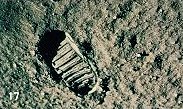 The Moon is no longer unattainable. A dozen humans, all Americans,
have made those odd bounding motions they called "moonwalks" on the
crunchy, cratered, ancient gray lava--beginning on that July day
in 1969.
But since 1972, no one from any nation has ventured back. Indeed,
none of us has gone anywhere since the glory days of
Apollo
except into low Earth orbit-- like a toddler who takes a few
tentative steps outward and then, breathless, retreats to the
safety of his mother's skirts.
The Moon is no longer unattainable. A dozen humans, all Americans,
have made those odd bounding motions they called "moonwalks" on the
crunchy, cratered, ancient gray lava--beginning on that July day
in 1969.
But since 1972, no one from any nation has ventured back. Indeed,
none of us has gone anywhere since the glory days of
Apollo
except into low Earth orbit-- like a toddler who takes a few
tentative steps outward and then, breathless, retreats to the
safety of his mother's skirts.
Once upon a time, we soared into the Solar System. For a few
years. Then we hurried back. Why? What happened? What was
Apollo really about?
The scope and audacity of John Kennedy's May 25, 1961, message to
a joint session of Congress on "Urgent National Needs" -- the
speech that launched the Apollo program-- dazzled
me. We would use rockets not yet designed and alloys not yet
conceived, navigation and docking systems not yet devised, in
order to send a man to an unknown world--a world not yet
explored, not even in a preliminary way, not even by robots--
and we would bring him safely back, and we would do it before the
decade was over. This confident pronouncement was made before any
American had even achieved Earth orbit.
 As a newly minted Ph.D., I actually thought all this had
something centrally to do with science. But the President did not
talk about discovering the origin of the Moon, or even about
bringing samples of it back for study. All he seemed to be interested
in was sending someone there and bringing him home.
It was a kind of gesture. [...]
As a newly minted Ph.D., I actually thought all this had
something centrally to do with science. But the President did not
talk about discovering the origin of the Moon, or even about
bringing samples of it back for study. All he seemed to be interested
in was sending someone there and bringing him home.
It was a kind of gesture. [...]
The Apollo program is really about politics, others
told me. This sounded more promising. Nonaligned nations would be
tempted to drift toward the Soviet Union if it was ahead in space
exploration, if the United States showed insufficient "national
vigor."
It didn't follow. Here was the United States, ahead of the Soviet
Union in virtually every area of technology--the world's economic,
military, and, on occasion, even moral leader--and Indonesia would
go Communist because Yuri Gagarin beat John Glenn to Earth orbit?
What's so special about space technology? Suddenly I understood.
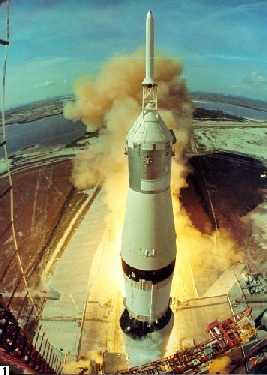 Sending people to orbit the Earth or robots to orbit the Sun
requires rockets-- big, reliable, powerful rockets.
Those same rockets can be used for nuclear war. The same technology
that transports a man to the Moon can carry nuclear warheads
halfway around the world. [...] Of course strategic rockets were
already tested on Earth. But having a ballistic missile with a
dummy warhead into a target zone in the middle of the Pacific
Ocean doesn't buy much glory. Sending people to space captures
the attention and imagination of the world.
Sending people to orbit the Earth or robots to orbit the Sun
requires rockets-- big, reliable, powerful rockets.
Those same rockets can be used for nuclear war. The same technology
that transports a man to the Moon can carry nuclear warheads
halfway around the world. [...] Of course strategic rockets were
already tested on Earth. But having a ballistic missile with a
dummy warhead into a target zone in the middle of the Pacific
Ocean doesn't buy much glory. Sending people to space captures
the attention and imagination of the world.
You wouldn't spend the money to launch astronauts for this reason
alone, but of all the ways of demonstrating rocket potency, this
one works best. It was a rite of national manhood; the shape of
the boosters made this point readily understood without anyone
actually having to explain it. The communication seemed to be
transmitted from unconscious mind to unconscious mind without
the higher mental faculties catching a whiff of what was going on.
[...]
For me, the most ironic token of that moment in history is the
plaque signed by President Richard M. Nixon that Apollo 11
took to the Moon. It reads: "We came in peace for all mankind."
As the United States was dropping 7.5 megatons of conventional
explosives on small nations in Southeast Asia, we congratulated
ourselves on our humanity: We would harm no one on a lifeless rock.
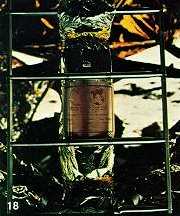 That plaque is there still, attached to the base of the
Apollo 11 Lunar Module, on the airless desolation of
the Sea of Tranquility. If no one disturbs it, it will still be
readable a million years from now.
That plaque is there still, attached to the base of the
Apollo 11 Lunar Module, on the airless desolation of
the Sea of Tranquility. If no one disturbs it, it will still be
readable a million years from now.
Six more missions followed Apollo 11, all but one of
which successfully landed on the lunar surface. Apollo 17
was the first to carry a scientist. As soon as he got there, the
program was canceled. The first scientist and the last human to
land on the Moon were the same person. The program has already
served its purpose that July night in 1969. The half-dozen
subsequent missions were just momentum.
Apollo was not mainly about science. It was not even
mainly about space. Apollo was about ideological
confrontation and nuclear war--often described by such euphemisms
as world "leadership" and national "prestige."
Nevertheless, good space science was done. We now know more about
the composition, age, and history of the Moon and the origin of
the lunar landforms. We have made progress in understanding where
the Moon came from. Some of us have used lunar cratering statistics
to better understand the Earth at the time of the origin of life.
But more important than any of this, Apollo provided
an aegis, an umbrella under which brilliantly engineered robot
spacecraft were dispatched throughout the Solar System, making
that preliminary reconnaissance of dozens of worlds. The offspring
of Apollo have now reached the planetary frontiers.
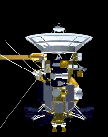 If not for Apollo--and, therefore, if not for the
political purpose it served--I doubt whether the historic American
expeditions of exploration and discovery throughout the Solar
System would have occurred. The
Mariners,
Vikings,
Pioneers,
Voyagers,
and Galileo
are among the gifts of Apollo.
Magellan
and Cassini
are more distant descendants.
Something similar is true for the pioneering Soviet efforts
in Solar System exploration, including the first soft landings
of robot spacecraft-- Luna 9, Mars 3,
Venera 8 --on other worlds.
If not for Apollo--and, therefore, if not for the
political purpose it served--I doubt whether the historic American
expeditions of exploration and discovery throughout the Solar
System would have occurred. The
Mariners,
Vikings,
Pioneers,
Voyagers,
and Galileo
are among the gifts of Apollo.
Magellan
and Cassini
are more distant descendants.
Something similar is true for the pioneering Soviet efforts
in Solar System exploration, including the first soft landings
of robot spacecraft-- Luna 9, Mars 3,
Venera 8 --on other worlds.
Apollo conveyed a confidence, energy, and breadth
of vision that did capture the imagination of the world.
That too was part of its purpose. It inspired an optimism about
technology, and enthusiasm for the future. If we could fly to
the Moon, as so many have asked, what else were we capable of?
Even those who opposed the policies and actions of the United
States--even those who thought the worst of us-- acknowledged
the genius and heroism of the Apollo program.
With Apollo, the United States touched greatness.
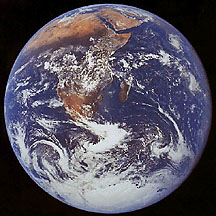 When you pack your bags for a big trip, you never know what's
in store for you. The Apollo astronauts on their
way to and from the Moon photographed their home planet.
It was a natural thing to do, but it had consequences that few
foresaw. For the first time, the inhabitants of Earth could
see their world from above--the whole of Earth, the Earth in
color, the Earth as an exquisite spinning white and blue ball
set against the vast darkness of space.
Those images helped awaken our slumbering planetary consciousness.
They provide incontestable evidence that we all share the same
vulnerable planet. They remind us of what is important and
what is not. They were the harbingers of Voyager's
pale blue dot.
When you pack your bags for a big trip, you never know what's
in store for you. The Apollo astronauts on their
way to and from the Moon photographed their home planet.
It was a natural thing to do, but it had consequences that few
foresaw. For the first time, the inhabitants of Earth could
see their world from above--the whole of Earth, the Earth in
color, the Earth as an exquisite spinning white and blue ball
set against the vast darkness of space.
Those images helped awaken our slumbering planetary consciousness.
They provide incontestable evidence that we all share the same
vulnerable planet. They remind us of what is important and
what is not. They were the harbingers of Voyager's
pale blue dot.
We may have found that perspective just in time, just as our
technology threatens the habitability of our world.
Whatever the reason we first mustered the Apollo
program, however mired it was in Cold War nationalism and the
instruments of death, the inescapable recognition of the unity
and fragility of the Earth is its clear and luminous dividend,
the unexpected final gift of Apollo.
What began in deadly competition has helped us to see that
global cooperation is the essential precondition for our
survival.
Travel is broadening.
It's time to hit the road again.
Excerpt from
Carl Sagan (1994, pp.206-215)
Pale Blue Dot: A Vision of the Human Future in Space
New York: Random House
 Page maintained by
Alex Petrov
Page maintained by
Alex Petrov
Created 2000-05-05, last updated 2011-07-09.
 The Moon is no longer unattainable. A dozen humans, all Americans,
have made those odd bounding motions they called "moonwalks" on the
crunchy, cratered, ancient gray lava--beginning on that July day
in 1969.
But since 1972, no one from any nation has ventured back. Indeed,
none of us has gone anywhere since the glory days of
Apollo
except into low Earth orbit-- like a toddler who takes a few
tentative steps outward and then, breathless, retreats to the
safety of his mother's skirts.
The Moon is no longer unattainable. A dozen humans, all Americans,
have made those odd bounding motions they called "moonwalks" on the
crunchy, cratered, ancient gray lava--beginning on that July day
in 1969.
But since 1972, no one from any nation has ventured back. Indeed,
none of us has gone anywhere since the glory days of
Apollo
except into low Earth orbit-- like a toddler who takes a few
tentative steps outward and then, breathless, retreats to the
safety of his mother's skirts.
 As a newly minted Ph.D., I actually thought all this had
something centrally to do with science. But the President did not
talk about discovering the origin of the Moon, or even about
bringing samples of it back for study. All he seemed to be interested
in was sending someone there and bringing him home.
It was a kind of gesture. [...]
As a newly minted Ph.D., I actually thought all this had
something centrally to do with science. But the President did not
talk about discovering the origin of the Moon, or even about
bringing samples of it back for study. All he seemed to be interested
in was sending someone there and bringing him home.
It was a kind of gesture. [...]
 Sending people to orbit the Earth or robots to orbit the Sun
requires rockets-- big, reliable, powerful rockets.
Those same rockets can be used for nuclear war. The same technology
that transports a man to the Moon can carry nuclear warheads
halfway around the world. [...] Of course strategic rockets were
already tested on Earth. But having a ballistic missile with a
dummy warhead into a target zone in the middle of the Pacific
Ocean doesn't buy much glory. Sending people to space captures
the attention and imagination of the world.
Sending people to orbit the Earth or robots to orbit the Sun
requires rockets-- big, reliable, powerful rockets.
Those same rockets can be used for nuclear war. The same technology
that transports a man to the Moon can carry nuclear warheads
halfway around the world. [...] Of course strategic rockets were
already tested on Earth. But having a ballistic missile with a
dummy warhead into a target zone in the middle of the Pacific
Ocean doesn't buy much glory. Sending people to space captures
the attention and imagination of the world.
 That plaque is there still, attached to the base of the
Apollo 11 Lunar Module, on the airless desolation of
the Sea of Tranquility. If no one disturbs it, it will still be
readable a million years from now.
That plaque is there still, attached to the base of the
Apollo 11 Lunar Module, on the airless desolation of
the Sea of Tranquility. If no one disturbs it, it will still be
readable a million years from now.
 If not for Apollo--and, therefore, if not for the
political purpose it served--I doubt whether the historic American
expeditions of exploration and discovery throughout the Solar
System would have occurred. The
If not for Apollo--and, therefore, if not for the
political purpose it served--I doubt whether the historic American
expeditions of exploration and discovery throughout the Solar
System would have occurred. The
 When you pack your bags for a big trip, you never know what's
in store for you. The Apollo astronauts on their
way to and from the Moon photographed their home planet.
It was a natural thing to do, but it had consequences that few
foresaw. For the first time, the inhabitants of Earth could
see their world from above--the whole of Earth, the Earth in
color, the Earth as an exquisite spinning white and blue ball
set against the vast darkness of space.
Those images helped awaken our slumbering planetary consciousness.
They provide incontestable evidence that we all share the same
vulnerable planet. They remind us of what is important and
what is not. They were the harbingers of Voyager's
When you pack your bags for a big trip, you never know what's
in store for you. The Apollo astronauts on their
way to and from the Moon photographed their home planet.
It was a natural thing to do, but it had consequences that few
foresaw. For the first time, the inhabitants of Earth could
see their world from above--the whole of Earth, the Earth in
color, the Earth as an exquisite spinning white and blue ball
set against the vast darkness of space.
Those images helped awaken our slumbering planetary consciousness.
They provide incontestable evidence that we all share the same
vulnerable planet. They remind us of what is important and
what is not. They were the harbingers of Voyager's